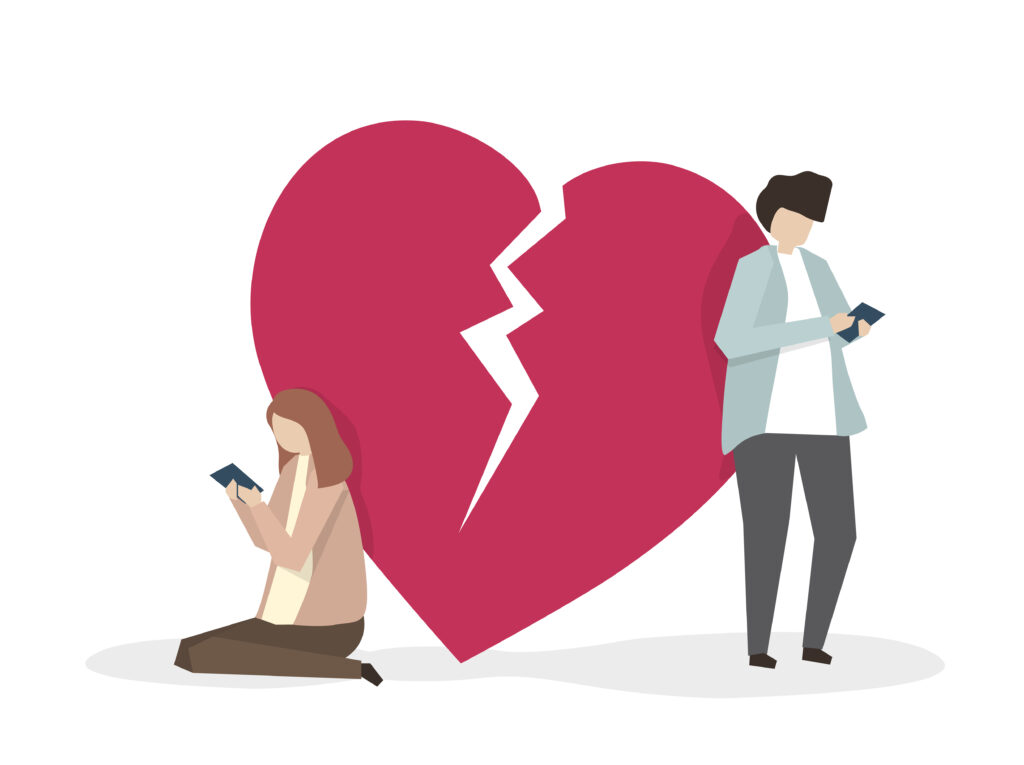Last updated on December 20th, 2024 at 01:16 pm
Separation and divorce can be a devastating and challenging experience for everyone involved. The end of a marriage can evoke a wide range of emotions, including anger, sadness, fear, and uncertainty. If you are facing the end of your marriage, it may be difficult to know where to turn or what to do next. However, with the right support and resources, you can learn to cope with the pain and move forward in a healthy and positive manner.
Understanding the Emotional Impact of Separation and Divorce

One of the initial steps in coping with separation and divorce is to understand the emotional impact it can have on you. This period may be marked by intense sadness, anger, and confusion. You might feel as though you are losing a part of yourself, making it challenging to envision a future without your spouse. It is essential to acknowledge these feelings and grant yourself permission to experience them. Avoid suppressing or ignoring your emotions, as this can exacerbate the situation in the long run.
Reaching Out for Support
Another crucial step in coping with separation and divorce is to seek support. This support can take many forms, including therapy, support groups, and the companionship of friends and family. It is essential to have trustworthy individuals in your life with whom you can confide. They can offer a listening ear and a shoulder to cry on when you need it most. Additionally, they can assist you in processing your feelings and navigating the challenges you are facing.
Finding Health and Wellness Activities
It is also essential to prioritize your health and wellness during this time. This can involve activities such as exercise, yoga, and meditation. Exercise is particularly important, as it can alleviate stress and anxiety while enhancing your mood. Furthermore, maintaining a healthy diet and ensuring adequate rest and sleep can support both your physical and emotional well-being.
Building a Strong Support System
One of the keys to coping with separation and divorce is to build a strong support system. This can include family, friends, and mental health professionals such as therapists and psychologists. It is essential to have individuals in your life whom you can rely on and who understand your experience. They can offer the emotional support and encouragement you need to navigate this challenging time.
Planning for the Future
Ultimately, it is essential to begin contemplating your future and envisioning what you want your life to be like after your separation or divorce. This may involve setting new goals, exploring fresh interests and hobbies, and pursuing a new career. Concentrating on the future can help divert your attention from the present and provide you with something positive to anticipate.
The Stages of Separation
The stages of separation can differ for each individual, but there are generally five stages that people experience: denial, anger, bargaining, depression, and acceptance. These stages are not linear, and it is common for individuals to move back and forth between them.
How Long Does It Take to Get Over a Separation and Divorce?
The time required to recover from a separation or divorce can vary significantly. It depends on several factors, including the duration of the marriage, the degree of emotional attachment, and the individual’s coping strategies. On average, it may take anywhere from six months to two years to fully heal from a separation or divorce. However, this is merely a general guideline, and the healing process can be shorter or longer for each person.
What Not to Do During a Separation
There are specific actions you should avoid during a separation. These include:
Why Is Separation So Painful?

Separation and divorce can be profoundly painful as they entail the loss of a significant relationship. This often results in feelings of sadness, anger, and a deep sense of loss. Furthermore, the dissolution of a marriage can lead to changes in lifestyle and financial status, which can exacerbate the stress and challenges of the situation.
During a separation or divorce, individuals often face complex emotions and must make difficult decisions. They may feel overwhelmed by the changes occurring in their lives and struggle to come to terms with the end of the relationship. This can lead to feelings of grief, anxiety, and depression, which can be intense and overwhelming.
Moreover, separation can be a traumatic experience as it often entails the breakdown of trust and the violation of the emotional bond established between the two individuals. When a relationship ends, rebuilding trust and healing the emotional wounds inflicted during the separation process can be challenging. This difficulty can hinder moving on from the relationship and may result in long-term emotional pain.
Additionally, separation and divorce can significantly affect children and families. Children may experience feelings of loss, confusion, and insecurity as they adapt to their new reality. They may struggle with changes in family dynamics and the loss of contact with one parent. This can have long-term effects on their well-being, making separation a painful experience for the entire family.
Conclusion
Separation and divorce can be difficult and challenging experiences, but it is possible to overcome the heartbreak and move forward in a healthy and positive manner. By seeking support, prioritizing your health and wellness, building a strong support system, and planning for the future, you can discover the strength and resilience needed to navigate this challenging time. If you are facing a separation or divorce, remember that you are not alone and that there is hope for a brighter future.


